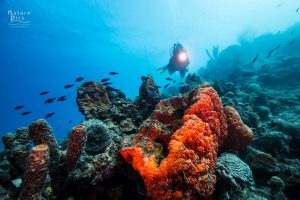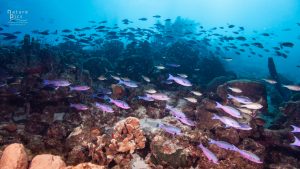Ocean charity makes initial grant of $90,000 to marine parks on six Dutch Caribbean islands. Award will fund projects including coral protection, and training youth marine rangers.
Ocean conservation charity Blue Marine Foundation has announced it is awarding $90,000 in funding to support marine conservation in the Dutch Caribbean. A range of projects run by protected area management organisations on six islands will each receive a grant of $15,000. The funding is the first step in a longer-term partnership to support the islands and help secure sustainable financing through the Dutch Caribbean Nature Alliance (DCNA) Trust fund.

Photo credit: Naturepics: Y.+T. Kühnast
To improve ocean governance, Blue Marine uses a combination of top-down intervention and bottom-up project delivery to help local communities at the front line of conservation. It will work together with the DCNA to help marine-park organisations protect the unique and threatened biodiversity of the Dutch Caribbean.
The new partnership is an important development in the successful management of marine conservation parks in the Dutch Caribbean. The UK-based charity has established a small-grants fund to provide rapid access to support for critical conservation projects run by marine parks.
The individual projects and their local partners are:
- Aruba: monitoring water quality in its Marine Protected Area (MPA) and wetlands, in conjunction with Fundacion Parke Nacional Aruba (FPNA)
- Bonaire: assessing losses of stony corals (Acroporids e.g. staghorn and elkhorn coral), and their potential future recovery, in conjunction with Stichting Nationale Parken Bonaire (STINAPA Bonaire)
- Curaçao: establishing a bus transport marine education program and youth marine ranger program, in conjunction with Caribbean Research and Management of Biodiversity (CARMABI)
- Saba: provision of a climate control room for the new marine field station, in conjunction with the Saba Conservation Foundation (SCF).
- Sint Eustatius: assessing the health of coral, the abundance of fish life and the diversity of reefs, in conjunction with St. Eustatius National Parks Foundation (STENAPA)
- St Maarten: monitoring marine habitats, in conjunction with Nature Foundation St. Maarten (NFSXM)

Photo credit: Naturepics: Y.+T. Kühnast
Unique ecosystems on the islands are vulnerable to threats such as feral livestock causing sedimentation on reefs, and invasive species, including lionfish and coral diseases. They are also at risk from overfishing, climate change, coastal development, erosion and the build-up of harmful algae caused by waste water.
The islands of the Dutch Caribbean are also home to important “blue carbon” habitats – ocean ecosystems such as seagrasses, mangroves and other marine plants that suck up and lock away carbon from the earth’s atmosphere. Seagrass is so efficient at this it can capture and store carbon dioxide up to 35 times faster than tropical rainforests. The management and protection of these blue carbon habitats is vital in the fight against climate change.
Current marine conservation measures in the islands include a 25,390 square km mammal and shark sanctuary- Yarari sanctuary- across the Exclusive Economic Zone of Bonaire, Saba and St Eustatius. All six islands have inshore Marine Protected Areas ranging in size from 10 to 60 sq km.
Blue Marine’s Senior Project Manager Jude Brown commented: “Having recently visited two of the islands, I witnessed first-hand how special this region is. Diving the waters off Saba I saw huge Tarpon swimming amongst shoals of blue tang, and hawksbill turtles feeding on the seagrass beds. I also witnessed the challenges these islands are facing from coral disease to issues with coastal development. It is an exciting opportunity to work in the Dutch Caribbean, bringing expertise and funding from Blue Marine to join with the wealth of knowledge already on the islands, to work together to protect the important marine life arounds these islands.”
Tadzio Bervoets, Director of the DNCA commented: “The Dutch Caribbean consists of the Windward Islands of St. Maarten, Saba, and St. Eustatius and the Leeward Islands of Aruba, Bonaire and Curaçao. The nature of the Dutch Caribbean contains the richest biodiversity in the Kingdom of the Netherlands. The diverse ecosystems are a magnet for tourism and at the same time the most important source of income for residents of the Dutch Caribbean. Nature on the islands is unique and important but it is also fragile. The coming week we will be in The Netherlands to present a Climate Action Plan for the Dutch Caribbean to emphasize the urgent need for a climate smart future for our islands.”
Cover photo: Coral reefs in the Dutch Caribbean (Photo credit: Naturepics: Y.+T. Kühnast – all rights reserved)


















